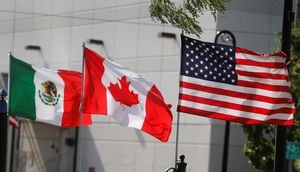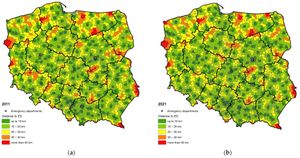On February 25, 2025, the United Nations Security Council took a significant step concerning the protracted and violent Ukraine conflict, endorsing the U.S.-proposed resolution titled 'Path to Peace.' This resolution marks the first attempt by the Council to address the conflict formally since the Russian invasion began three years ago. Notably, the resolution received backing from 10 member states, including Russia, with five abstentions, and no permanent members exercised their veto rights, highlighting the precarious consensus achievable amid the contentious issue.
Dorothy Shea, the U.S. Chargé d'Affaires at the United Nations, characterized the resolution as 'a first step on the path to peace,' celebrating the cooperative spirit among members and the need for active engagement to achieve stability. 'This resolution is symbolic and serves as the beginning of our commitment to fostering peaceful relations,' Shea added, encouraging collective responsibility among nations involved.
The passage of this resolution followed the endorsement of two resolutions by the UN General Assembly — one led by Ukraine along with European allies and another proposed by the United States, which underwent amendments. The U.S. resolution insists on the urgent need to halt hostilities and emphasizes establishing enduring peace between Ukraine and Russia.
While the U.S. document expressed sorrow over the casualties resulting from the conflict, it stopped short of officially condemning Russian aggression, reflecting what many analysts describe as a 'neutral' position taken by the Biden administration. This has drawn mixed reactions, particularly from European allies, who contend stronger language is necessary to convey the severity of the situation.
The General Assembly's earlier resolutions demanded immediate action, explicitly calling for the withdrawal of Russian troops from Ukrainian territory. According to reports, these resolutions garnered substantial support, with 93 countries voting for them, only 18 voting against, and 65 abstaining, illustrating broad international concern over the humanitarian crisis precipitated by the invasion.
Political analysts are noting the increasing urgency for diplomatic resolution methods, as the conflict has led to significant civilian casualties and displacements, with estimates indicating tens of thousands internally displaced. The humanitarian situation continues to be dire.
Reactions to the resolution's passage were swift. Russian UN Ambassador Vasily Nebenzya indicated support for the U.S. initiative, considering it ‘a step in the right direction.' While some Russian officials have criticized nations they perceive as antagonistic, Nebenzya welcomed this change, stating, ‘This resolution can facilitate discussions necessary for progress.’
European representatives, including the UK’s UN Ambassador Barbara Woodward, articulated concerns over failing to distinguish between the aggressor and the victim. Woodward stressed, 'The basis for peace must reject any semblance of ambiguity about aggression.' She emphasized the importance of clear terms, stating: 'A resolution must reflect the nuances; equanimity must not be the path we take.'
Meanwhile, opposition to the resolutions remained staunch. The U.S. faced backlash for its supporting position from nations such as Hungary and Israel, which had previously aligned with Russia on various occasions. U.S. statements leading up to the vote indicated worries over potential divisions within the alliance against Russia, especially concerning the efficacy of negotiating terms.
Despite the criticism surrounding American language and approach toward the crisis, analysts observe Biden's administration may be testing diplomatic waters delicately, seeking to leverage and balance international relationships during such tumultuous times. Observers interpreted this as part of President Biden's broader strategy to position the United States as a potential broker of peace and stability.
Mariana Betza, Ukraine’s Deputy Foreign Minister, framed the moment as ‘historic,’ emphasizing the necessity for decisive action against what she termed Russian aggression. Betza stated before the vote, 'The decisions we make today will resonate beyond our borders and can define the future of our democratic world.'
Some experts predict the success of these resolutions could motivate more countries to publicly reassess their positions on the conflict and encourage active involvement. Indeed, with the humanitarian situation worsening by the day, the international community's engagement is becoming more imperative as millions of lives hang precariously on the balance.
Moving forward, the question of whether this momentum can translate to substantial action remains to be seen. Future sessions at the UN will be pivotal, particularly as nations navigate complex geopolitical landscapes and shifting alliances shaping their collective responses. For Ukraine, the focus remains clear: ‘We seek justice, peace, and the restoration of our sovereign territory,' Betza concluded, reiteratively underscoring the importance of sustained international solidarity.



